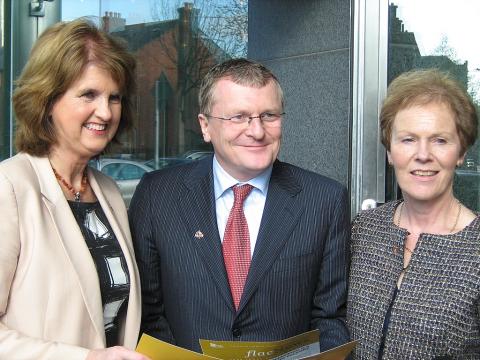Too big to fail versus too small to matter

The proposed personal insolvency bill "may not be the best model and may even be counter productive", a conference organised by FLAC heard last week. By Sandy Hazel
Retaining the family home may not always be possible, even with new debt laws due next year. Specific remedies and a whole of Government approach is needed to offer a “fair resolution between debtor and creditor” Minister for Social Protection Joan Burton told a meeting of legal and banking bodies this week. The conference, organised by the Free Legal Advice Centres (FLAC) discussed the proposed personal insolvency legislation.
While businesses in Ireland have legal processes in place to discharge debts, individuals currently do not. According to TASC, household debt in Ireland is around €190bn. The total of residential mortgage loans outstanding is €113bn of which about €14bn are in arrears. As of December 2011, 75,000 households have had their mortgage restructured.
Clearly, mortgage debt is crippling the country and homeowners are not the only ones interested in solutions. The IMF also wants this mess sorted out, but for different reasons. A broke society cannot spend; even in the midst of debt crises, we are to borrow and risk again. Other countries are watching Ireland and how we intend to sort this out. The proposed insolvency legislation aims to offer schemes where individuals can apply for debt relief certificates, debt settlement arrangements or personal insolvency arrangements with a view to retaining the family home.
FLAC’s submission on the proposed bill highlights concerns over thresholds of creditor approval – the banks may just not agree to the insolvency proceedings, and unclear provisions for the fate of rejected applicants. Serious questions are also raised over licensing, monitoring, fees and costs of ‘trustees’; mediators in the insolvency process.
The proposed bill “may not be the best model and may even be counter productive”, Professor Jason Kilborn told the conference. “Banks can agree to modify the risk reasonably but they don’t. Why? They don’t have the incentive - it could be spite, irrationality or lack of interest. They may want to take the quicker loss now, report to investors and so externalise the loss on to society. Terms are not good; the creditor holds the absolute veto.” Kilborn, from the John Marshall School of Law in Chicago, feels that the French model of personal debt management works because the Bank of France “becomes the 800lb gorilla in the room demanding that creditors act sensibly. There is acknowledgment that creditors cannot squeeze blood from a stone, negotiations need to become more balanced.” Kilborn points to the “pernicious relationship where creditors keep debtors under the thumb. The banks need to accept this, acknowledge built in losses, make better underwriting decisions.” He said that further losses are incurred in fruitless enforcement and in the US foreclosure is proven to cause a 60% loss.
Financial journalist Jill Kerby said the legislation won’t work. “It is overly complicated and it would take far too long to discharge the debt,” she told the conference. “If we give debt forgiveness to individuals then the State’s debt should also be forgiven,” she said. Kerby suggested that prevention needs more scrutiny and highlighted the role of insurance. “We used to have indemnity bonds, whatever happened to them?”
Egil Rokhaug, senior political adviser to the Norwegian Ministry of Children, Equality and Social Inclusion, presented the Norwegian Debt Settlement Act as a model of personal insolvency. Norway suffered similar housing and personal debt crises in the early 1990s.
Localised enforcement offices assess and instigate a process where new market values are applied and loans restructured or cleared completely. The losses to creditors in the scheme “are less than insolvency”. However, with a smaller percentage of mortgages in distress, and with no banking crisis, Norway’s banks were better able to absorb those hits, a fraction of what it would cost to offer the same remedy in Ireland.
Could we afford to be so generous and would we want to? Moral hazard, according to some at the meeting, cannot be used by bailed out banks as an excuse to not engage in this process. The words black, pot and kettle come to mind. {jathumbnailoff}
Image top: Sandy Hazel
